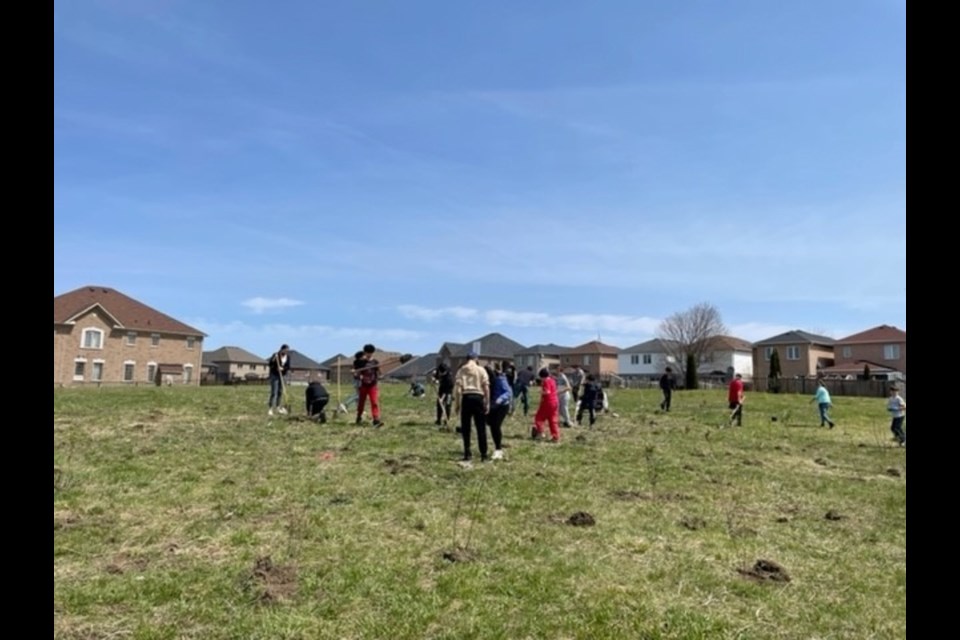What started as a classroom of motivated Raptors fans who wanted to make a difference in their community, has turned into a multi-year project that will help define Fieldcrest Elementary School for years to come.
The "Weed the North" project began in October of 2021 when the students in Anne Wright’s class decided they wanted to do something in their own backyard when learning about issues facing the environment.
“They learned about how this land is now being paved to make a priority of cars, we’re so concerned about where people are parking that we’re literally paving paradise to put up a parking lot,” explained Wright. “We talked about this—and because we’re interested in conserving water with Lake Simcoe—they were looking at how when water comes down and hits asphalt without any green area to go on all of that goes right into the sewers and into Lake Simcoe."
Phase one took place that fall when the students planted 100 trees in an identified overgrown weedy area on the school property, as the place for their “field of dreams.”
“With the help of Lake Simcoe Region Conservation Authority (LSRCA), the students came up with a four-phase plan of how we were going to restore this unused and unprotected area of our school yard that had just been left to go to waste,” said Wright.
To celebrate Education Week in May, phase two was executed with 100 plants added to the field in order to get a pollinator garden started with the help of Peter Shuttleworth from the LSRCA.
“The students wanted to make a mindful path around the area, so they could observe the pollinators and plants without destroying them or hurting the animals we’re trying to make the area for,” said Wright.
The idea for the project came from the students, spurned from discussions about how the school’s property used to be farmland.
“We were afraid if we don’t do something with the green space at our school then it might not be protected in our neighbourhood,” said Wright. “The land here used to be a farm and now it’s urban sprawl. The students wanted to do something where they could look back in a few years and say, ‘I was part of that’.
"They were really invested and what I found so interesting with the pollinator garden was that the students were given pods and they had to take all the little seeds out of them—it was meticulous hard work. They then had to plant those tiny seeds, make sure they grew, and then eventually we were able to transplant them into our pollinator garden. It’s been a long-term commitment these kids have taken on.”
Although the project was taken on by Wright’s class, it’s helped bring all students in the school together.
“The best thing that happened was when we were putting in the pollinator garden, the students from kindergarten were part of growing the wildflowers and they came out with the grade eights and it was like they went from reading buddies to eco-buddies,” Wright says. “We had the grade eights helping the little guys dig holes for the plants. It was great to see it wasn’t just my classes, but we had included the older students and they were mentoring the younger students. It turned into a great event.”
One of the most important aspects of the project says Wright, has been the support her class has received from the LSRCA, the school board, and the town.
“The Town of Bradford came in one Saturday morning and prepped the whole field for us,” she said. “We had the municipal government helping us, and just so many community people coming in to be a part of this project with the students. It’s been really cool.”
When the project first started, the students had these great big ideas—like building a tree fort and a coy pond—but it’s taught them the importance of putting in the work and working together to see a positive outcome.
“Reality set in and they realized it’s not an easy project and it takes labour,” said Wright. “I had no idea what we could do. We couldn’t have done this on our own, we had a village help us with this project. Without the LSRCA it probably would have just been a flowerbed. We wouldn’t see this take off without the town and school board. This couldn’t happen without a whole bunch of people on this journey with us and I hope the students learned to involve the community in projects they have and realize people are more than willing to help if you put in the elbow grease.”
The third and fourth phase of Weed The North are expected to come sometime in the next year.



